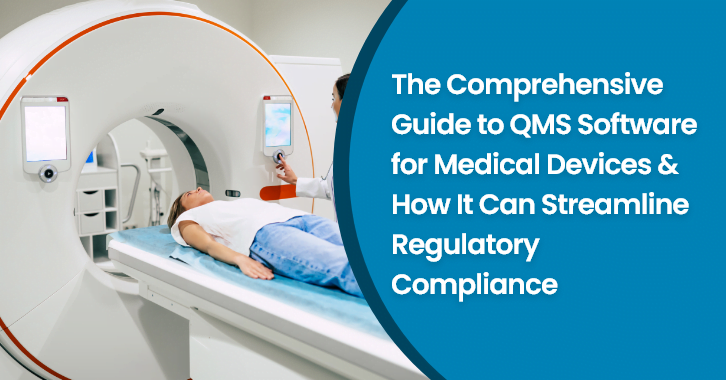
Quality Management System (QMS) Software is a technology solution that helps organizations manage, monitor, and improve the quality of their products or services. In the medical device industry, QMS software plays a vital role in managing the lifecycle of a device, from the initial design and manufacturing to its post-market surveillance. QMS for medical devices ensures compliance and efficiency throughout the entire process.
QMS software in the medical device industry ensures that all devices meet both regulatory requirements and customer expectations. It helps in streamlining processes, identifying and mitigating risks, and driving continuous improvement in device quality.
Benefits of Using QMS Software for Medical Devices

Utilizing QMS software for medical devices brings a plethora of benefits, especially in the highly-regulated medical device industry.
Process Efficiency: QMS software automates repetitive tasks, reduces redundancy, and streamlines operations. It increases process efficiency, resulting in significant time and cost savings.
Quality Improvement: By identifying process gaps, managing non-conformances, and facilitating corrective actions, QMS software helps improve the quality of medical devices.
Risk Management: QMS software provides tools for risk assessment, helping companies identify potential issues early in the device lifecycle. This proactive approach allows for timely mitigation and prevention of potential problems.
Regulatory Compliance: QMS software ensures compliance with international standards and regulatory requirements, like FDA’s Quality System Regulation (QSR) and ISO 13485.
Regulatory Compliance with QMS Software for Medical Devices
 Regulatory compliance is of utmost importance in the medical device industry. Non-compliance can lead to hefty fines, damaged reputation, and even product recalls.
Regulatory compliance is of utmost importance in the medical device industry. Non-compliance can lead to hefty fines, damaged reputation, and even product recalls.
QMS software for medical devices helps maintain compliance by automating key processes such as document control, training management, and audits. It keeps a complete record of all activities, making it easier to provide evidence of compliance during audits.
QMS software also keeps you updated with the latest regulatory changes. This feature is critical as the medical device industry is subjected to frequent changes in regulations.
How to Choose the Right QMS Software for Your Medical Device Company?
 Choosing the right QMS software is crucial to effectively manage the quality and compliance of your medical devices. Here are some tips to guide your decision.
Choosing the right QMS software is crucial to effectively manage the quality and compliance of your medical devices. Here are some tips to guide your decision.
Understand Your Needs: Each business is unique, so your QMS for Small Business should cater to your specific needs. Identify your key challenges and business objectives before choosing your software.
Scalability: As your business grows, so will your quality management needs. Choose a scalable solution that can accommodate this growth.
Ease of Use: An intuitive, user-friendly interface is essential for easy adoption and usage of the software by your team.
Integration: Your QMS software should integrate seamlessly with your existing systems and tools.
Vendor Support: Look for vendors that provide excellent customer support and offer training resources to help you make the most of the software.
QMS Implementations & Best Practices for a Successful Roll-Out of Your New Quality Management System
 Successfully implementing a QMS, whether it’s a QMS for small businesses or for larger organizations, requires a strategic approach. Here are some best practices to ensure a successful roll-out.
Successfully implementing a QMS, whether it’s a QMS for small businesses or for larger organizations, requires a strategic approach. Here are some best practices to ensure a successful roll-out.
Plan: Begin with a clear plan that includes your objectives, timeline, responsibilities, and resources needed.
Involve Your Team: The successful implementation of a QMS software depends largely on your team. Involve them in the process and provide adequate training.
Start Small and Expand Gradually: Instead of implementing the entire system at once, start with the most critical processes and expand gradually.
Monitor and Improve: Continuously monitor the system’s performance and make necessary improvements. A QMS is not a one-time setup but a continuous process.
Conclusion
QMS software for medical devices is an indispensable tool in the contemporary healthcare industry. It not only ensures the production of high-quality, safe, and effective medical devices but also simplifies regulatory compliance. The decision to implement a QMS software can revolutionize your organization, paving the way for enhanced efficiency, risk management, and continuous improvement.
Choosing the right software requires a clear understanding of your business needs and future growth projections. Whether you are a small business or a large-scale enterprise, the scalability, ease of use, integration capabilities, and vendor support are key considerations that can’t be overlooked.
The successful implementation of a QMS software requires careful planning, team involvement, gradual roll-out, and continuous monitoring and improvement. It’s not just about deploying a new system; it’s about fostering a culture of quality and excellence within your organization.
In an industry where patient safety is paramount, and the margin for error is minimal, QMS software for medical devices is your ally. It not only assists you in meeting regulatory requirements but also in exceeding customer expectations. So, whether you are a startup medical device company or an established player, the benefits of implementing a robust QMS software are too compelling to ignore.
Remember, quality is not a destination, but a continuous journey. With the right QMS software, your journey towards achieving and maintaining quality becomes significantly smoother. So, take a step towards excellence, implement a QMS software, and witness the transformative impact on your medical device company.
About TLM QMS Software for Medical Devices Companies
Bringing a new medical device to market is a complex process, and while QMS software for medical devices can significantly aid risk management, the cost can be prohibitive, especially for startups.
ISO 13485 requires special features in QMS specific to the life sciences industry. Total Lean Management (TLM) offers a comprehensive solution, ensuring easy compliance with standards such as ISO 13485, ISO 14971, MDSAP, FDA 21 CFR Part 11/820, ISO 31000, and ISO 14971 risk management for medical devices.
TLM’s QMS for medical devices is appreciated by customers for its unique Upstream/Downstream dual technology user environment. This feature provides quality professionals with a feature-rich QMS while allowing other users to access only the key features they need through a web app, preventing them from being overwhelmed by the full range of options in the main application. This software can be applied to a variety of medical devices, from spinal screws to diagnostic tools. Visit the TLM website today to learn more.





 Demos
Demos